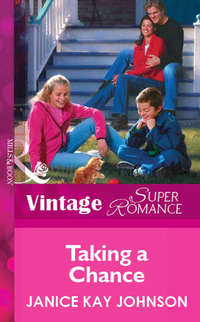
Полная версия
Open Secret
Standing, she asked, “You mean, I’ll be the one who contacts them when you find them?”
“If you prefer. If you decide the initial contact would be better made by a third party, I can do that for you. But let’s not worry about that until we get to it.”
“It might be a shock to have someone call you out of the blue and say, I’m your sister.”
Or, I’m your child’s real mother. His gaze strayed to his son’s smiling face.
Oh, yeah. That would be a real shock.
“I’ll be in touch, Ms. Chauvin.”
CHAPTER TWO
CARRIE ST. JOHN left her car parked in the circular driveway in front of her parents’ house. Although she’d grown up here at the crown of the hill in Magnolia, Seattle’s exclusive enclave, at twenty-six she had been away enough years now that she no longer thought of the elegant Georgian style brick house as home.
The front door opened even as she mounted the steps. Her mother, as beautiful and stylish as ever, came out smiling. “Sweetie, how nice to see you.”
Carrie bounced up the steps. “Hi, Mom!”
Her mother presented a cheek for a kiss.
“Your daffodils are gorgeous,” Carrie said.
“They are, aren’t they?” Her mother regarded the formal rose garden bounded by a perfectly trimmed boxwood hedge within the circle formed by the driveway. Brick paths bisected the beds filled with hybrid teas, not yet in bloom but cut often during the season to fill vases in the house. The paths and semicircle were perfectly aligned with the view over rooftops of the Puget Sound and downtown Seattle. Terra-cotta pots placed along the paths and at intersections brimmed with yellow and cream daffodils. They would be replaced, Carrie knew, with others when the tulips came in bloom.
Personally she would have underplanted the roses with perennials and runaway biannuals and annuals like violets and foxgloves and forget-me-nots, but her mother shuddered at the idea.
“The house is formal,” she always insisted. “The garden should be, too.”
Carrie suspected the real truth was that Mom hated the idea of plants romping free, popping up where they weren’t wanted, clambering onto paths. Mom liked order. Cottage gardens weren’t orderly.
To each her own, Carrie thought indulgently. Her mother undoubtedly missed her, but she must occasionally feel relief that she didn’t have to wonder in horror what mess lay behind her daughter’s closed bedroom door, or come down in the morning to a sink full of dirty dishes, or endure a dog shedding on the rugs and scratching the gleaming hardwood floors.
Carrie was more like her father. Although mostly orderly out of habit—and probably as a result of some nagging on Mom’s part—he tended to developed heaps of newspapers, books, notes and medical journals. Then he couldn’t find what he wanted and would mumble under his breath as he dug through various piles in search of whatever he sought. He had half a dozen pairs of reading glasses, too, because he could never find them, either. This way, he could usually locate a pair without too much trouble—sometimes by sitting on them, if he’d left them on a sofa cushion. Carrie had always imagined him living in a state of pleasant disorder, if Mom hadn’t been there to tidy up after him.
Carrie spared a thought for Dragon, the motley terrier mix she’d found, skinny, matted and starving, and insisted on keeping. She thought her father had actually grown to love Dragon, once the dog got over flopping onto his back and peeing every time anyone but Carrie walked up to him. Dragon had died the year before Carrie graduated from high school.
“I wish I could have a dog again,” she said, following her mother into the house.
“I understand that poodles don’t shed. If you ever do get one… Perhaps one of those darling small ones.”
Carrie wrinkled her nose. “You mean, the teacup poodles? The kind celebrities carry around in their handbags? Ugh. Those aren’t dogs. They’re… I don’t know. Hybrids, like your roses. A cross between a living, breathing animal and a Meissen figurine.”
“What would you prefer? A Great Dane?”
“A mutt, of course.” She laughed at her mother’s expression. “Don’t worry. I wouldn’t subject a dog to apartment life. But someday.” She sniffed. “What are we having for lunch?”
“Just fruit salad and cold cuts. And yes, you do smell Ruth’s sourdough biscuits. I shouldn’t indulge, but I can never help myself.”
Carrie hugged her mother impulsively. “You worry entirely too much about staying a size eight. Honestly, Mom, would the world end if you became a teeny bit plump?”
“A teeny bit plump becomes just plain plump in no time, followed by much, much worse,” her mother said firmly. “Which I doubt you will ever have to worry about.”
They didn’t look much alike. Katrina St. John, blond and blue-eyed, was nearly four inches taller than her daughter’s petite five foot three. Carrie, in contrast, had wavy dark hair she now kept cropped short, dark eyes that dominated a pixie face, and a body that was so boyish, she’d shopped in the children’s department for clothes long past the time when her friends were wearing bras and junior styles. She supposed she looked like one of her dad’s ancestors. Although tall, he was finer boned than Mom, with the long, narrow hands of the surgeon he was. The almost-black hair had certainly come from his side of the family, although his eyes were gray, not brown like hers.
In personality, she was more like her mother. Her father was a quiet, reserved man who attended large parties only when hospital politics required it or his wife made him. His idea of a high time was a dinner with one other couple and perhaps tickets to the symphony or ballet. Mom had a bigger circle of friends, liked to travel and, Carrie suspected, would have entertained on a larger scale more often if her introverted husband wouldn’t have been so dismayed.
Somehow, they’d borne a daughter who possessed all the qualities most likely to horrify each. Carrie had thrown tantrums still legendary at her preschool, been a congenital slob and an extrovert who couldn’t concentrate without music blasting in her ears. She’d overrun the house with friends and with her clutter: fingerpainting at the kitchen bar, Barbies and their endless tiny paraphernalia spread around the den, mud from her boots during her horse phase tracked over antique carpets.
Honestly, she was surprised they’d ever had a child, and not at all surprised she hadn’t had a sister or brother. At the height of her teenage rebellion, she used to scream, “You wish I’d never been born!” Their exhausted, baffled expressions had confirmed her passionate belief that she was an embarrassment to them.
She laughed at the memory of her histrionics. “I was the world’s worst teenager, wasn’t I?”
Her mother, who had been removing the fruit salad from the refrigerator, looked at her in surprise. “What on earth brought that on?”
“Oh…” She reached into the bowl and popped a grape into her mouth. “The house is just so serene now that I’m not here. I was like a…a mini tornado.”
“A whirling dervish, I used to think.” Her mother smiled at her. “I have no idea what one actually is, but it sounds right.”
“It does.” She took the bowl from her mother’s hands. “Are we eating in here?”
“I thought on the patio.”
“Oh, good.”
They carried food out to the lacy iron table set under the arbor on the brick patio outside French doors. A clematis with long, deep green leaves and small white flowers screened one side; roses were tied to the other supports so that from May through October, their heavy blooms perfumed the air.
Over lunch, Carrie asked about her father’s work and his health. He’d recently had an angioplasty to open a blocked artery.
“Has he slowed down at all?”
“You know him,” her mother replied. “I’m working on him, though. It’s past time for him to start thinking about retirement.”
Floored, Carrie echoed, “Retirement?”
“He is seventy.” The reminder wasn’t as silly as it sounded; Carrie’s father didn’t look his age. He could easily have passed for being in his late fifties. “There’s so much we talked about doing that we’ve never managed, given the hours he works. A leisurely trip to Europe would be lovely, for example. And he used to say he wanted to take up a musical instrument again. He almost never even sits down at the piano anymore.”
Her mother still sang in the church choir, and her father had played the violin through school. The house actually had a music room, bare of all else but a grand piano, two comfortable chairs and a cabinet for sheet music. Unfortunately Carrie hadn’t inherited her parents’ musical ear; she’d taken eight torturous years of piano lessons, at the end of which she mechanically played concertos through which her parents smiled bravely.
“I used to love to listen to him,” Carrie said. “I’d sit and color and he’d play the most beautiful music.”
“While I embroidered,” her mother agreed. “I loved those evenings.” She sighed. “He’s got more energy than he did before the procedure, but still he tends to come home, eat dinner, read the newspaper and go to bed. Your father’s getting too old for twelve-hour workdays.”
“Do you want me to talk to him?”
“Would you?” Her mother sounded so hopeful, Carrie wondered if this was why she’d invited her to lunch today. Not that they didn’t see each other regularly, of course, but this invitation had sounded more formal than most.
“Of course I will, Mom! I was hoping he was more himself.”
“I think he is himself. Unfortunately that self is seventy years old, and he doesn’t like to admit it.”
Carrie smiled. “Any more than you want to admit you’re sixty-six. Surely you’re hiding more than a few gray hairs.”
“Certainly not,” her mother said with dignity, then chuckled. “Actually I shudder when I see my roots. I suppose one of these days I should concede to nature. I can’t possibly go to a nursing home and not be gray, can I?” She slathered raspberry jam on a biscuit. “You haven’t said a word recently about Craig. How is he?”
The moment had come. Carrie had had her own agenda for today’s visit. Mom’s invitation had been perfectly timed.
Carrie took another biscuit herself. “I’m not seeing him anymore.” She made sure her tone was nonchalant, as if she didn’t have a minor ache under her breastbone every time she thought of their last fight. “He wanted to get married. I’m just not ready.”
“Carrie!” Her mother gaped. “He asked you to marry him?”
“Oh, he’s been asking forever.” She flapped her hand. “But this time he was serious. He wanted me to commit or else. I chose ‘or else.’”
“But…don’t you love him?”
She didn’t know how to answer that question even to herself, but she tried. “I suppose not. If I did, I’d want to get married, wouldn’t I? I do miss him, but…”
“I don’t understand.” Her mother shook her head. “Your father and I both thought…”
“That you’d be planning a summer wedding? Just think of how much money I’m saving you.”
Her mother gave her a reproving look. “I can’t think of anything in the world I’d love more than to plan your wedding.”
Damn it, her eyes welled with tears. She sniffed. “Thank you, Mom. Someday you’ll have the chance. I promise. Just…not yet.”
“We’re not getting any younger, you know.”
Oh God. Guilt. But also, she realized with a yawning pit where her stomach should be, the truth. Her dad’s heart condition had really scared her, making her face for the first time that her folks were aging. Her friends had parents in their fifties, not their sixties and seventies. Carrie’s dad had been forty-four when she was born, her mother forty. A late surprise.
Think how horrible it would be if they weren’t still alive to help her plan her wedding, for Daddy to walk her down the aisle, for her mother to smile through her tears from the first pew in the church. But she couldn’t get married just to make them happy. Lord knows, she didn’t want them still alive to see her divorced.
She took her mother’s hand across the table. “Craig is just part of it,” she confessed. “I’ve felt so restless lately. I’m thinking of quitting my job.”
Her mother looked aghast. “But you haven’t been there that long!”
“A year. And it’s deadly.”
She was a technical writer for a company that manufactured medical instruments. Her prose would not win her a Pulitzer. She bored even herself.
“But it was so perfect!” Her mother was still protesting. “It combines your medical expertise and your wonderful writing skill.”
Carrie had earned a degree in nursing before she’d realized—let herself realize—that she didn’t want to be a nurse. She’d grown up saying she wanted to be a doctor—a doctor and a ballerina, she’d told her kindergarten class—but her grades and test scores had hinted that medical school was not in her future. Given that Mom had been a surgical nurse when she met Julian St. John, nursing was the obvious backup. In their household, dinner table conversations were often about new surgical procedures or methods of pain control.
But Carrie had discovered that she was squeamish. She still shuddered at the memory of having to clean and pack an obese nursing home patient’s cavernous bed sores. She’d fled to the bathroom and thrown up afterward. Nonetheless, she did work for a year on a pediatric ward at an area hospital, where she fought a daily battle with her dislike of feeling subservient. Taking temperatures, installing IVs, stepping deferentially back when the doctor arrived… Ugh.
She’d gone from pediatric nursing to working in the genetics lab at Children’s Hospital, but that got boring once she quit marveling at the fact that she was looking at strands of DNA. From there she’d accepted the job at Helvix Medical Instruments.
Now, to her mother, she said, “I don’t even know if it’s the job. I just need a change. You know me. Constancy isn’t my middle name.”
“But…why?” her mother asked in perplexity. “Did we let you flit between interests so much that you never learned to stick with anything once it lost its novelty?”
That stung, although she tried to be honest with herself. Did she leave jobs and even relationships once the first excitement wore off?
Maybe.
She hated to think she was that shallow. But she didn’t know how else to explain the way she chafed whenever she looked around and thought, This is it. This is my life. She kept thinking the next job would be different, that she’d find where she fit. For a long time, she’d thought she did fit with Craig. Or perhaps she’d wanted him to be a fit, because he was so perfect.
In other words, her parents had loved him. A resident at Children’s Orthopedic, he’d reminded her from the beginning of her father even though they didn’t look at all alike. He was kind, patient, brilliant, unfailingly dignified. She’d never seen him talk while he had a mouthful of food, or laugh so hard she’d seen his larynx, or get really mad. Even that last scene. He’d been disappointed. Hurt. Not furious.
He wasn’t passionate. How could she be expected to love someone passionately whose own emotions were so damned reasonable?
She bit her lip. “I’m sorry, Mom. I know you liked him…”
“Oh, sweetie! It’s not that.” Her mother reached for her hand and squeezed, hard. “I just want you to be happy. To be settled.”
Carrie was startled by a rebellious thought. Maybe I don’t want to settle.
Why was it that being settled—what an awful word—had to be the ultimate goal?
And why did the very idea stifle her so?
“I’m not unhappy, you know,” she told her mother, squeezing back. “I just don’t necessarily want the same things you think I should. At least not yet. I’m different from you.” She hated how sad she sounded when she said the last, but couldn’t seem to help herself.
“I know.” Her mother tried to smile, but her eyes were damp and her voice had a quaver. “I know, dear.”
MARK CALLED Suzanne Chauvin two days later to give her the bad news.
“I located the attorney’s files. He handled only a few adoptions, and your sister’s and brother’s were not among them.”
There was a long silence. “But…” He waited some more while she sputtered another, “But…” As he’d seen her do in the office, at length she gathered herself. “How did you find his records?”
She sounded a little peeved at his quick success where she’d failed, and he didn’t blame her.
“Connections. I asked around until I found the attorney who bought his practice. He’d actually merged his small practice with another one, but he’d kept Cavanagh’s original files.”
“Maybe some of them got lost in the shuffle.”
“It’s conceivable, of course,” he admitted. “But the guy seemed pretty confident. Unless Cavanagh kept the files on your sister and brother at home, they should have been with the others.”
“If my aunt and uncle were insistent that the adoption be kept confidential…”
“The others were all similar, private adoptions. Why would Lucien’s and Linette’s be any different?”
“I…don’t know.”
As gently as possible, he said, “My suspicion is that your aunt and uncle misled you. They did have legal dealings at one time with Henry Cavanagh. He handled a minor lawsuit filed against your uncle in his business. So they knew his name, knew he was retired, maybe had even heard he died.”
“And thought I’d consider him a dead end,” she said slowly, anger growing in her voice. “I can imagine them doing that.”
“I’d like to talk to them. It would help if you accompanied me.”
Often clients hesitated at a time like this. Adoptees were often terrified of straining the bonds that held them to their adoptive families. No matter how desperately they were driven by the need to know where they came from, they were equally afraid of losing what they already had.
Suzanne was the exception. “You bet,” she agreed. “When?”
They left it that she’d arrange a time, and they would drive up to Bellingham together, where her aunt and uncle lived and where she’d grown up.
“Evening is fine,” he said. “My hours are always irregular. I have a housekeeper to watch Michael.”
She called him back a couple hours later and said her aunt had reluctantly agreed to meet with him the following evening.
“Uncle Miles won’t like it,” Suzanne said. “But if he blocks me too obviously, it’ll look like he’s hiding something. And in his view, no decision he’s ever made is wrong, so what does he have to hide?”
“And he never admits he’s wrong?” Mark guessed.
“Not in my memory,” she said with a tartness that made him like her anew.
She lived in Edmonds, a pricey community north of Seattle that clung to a hillside dropping to the Sound. The ferry traffic dominated the main route from the freeway, backed up for miles on summer weekends when vacationers were escaping to Hood Canal or the Washington coast. Downtown Edmonds catered to visitors with small shops and restaurants, all within a couple of blocks of the ferry terminal and the beach.
Suzanne’s was a modest older home on a street of larger ones, Mark discovered the next evening. It had the look of a summer cabin, simple and boxy, painted gray with white trim, the attached garage appearing to be a later addition.
Her yard defied the norm in this neighborhood, whether by design or neglect, he couldn’t tell. Her lawn was ragged and studded with dandelions, which the next door neighbor with his velvet green sward probably didn’t appreciate. Old shrubs rambled without any apparent effort to prune them, one ancient lilac nearly blocking a window. The dark turned earth in a few beds showed that she’d made some effort there, while grass wandered into others.
She came out immediately, so he didn’t get a chance to see the interior. She looked as pretty as spring in a short, lacy cardigan over a tank top and a flowery skirt that swirled around her legs as she got in.
“All set?”
She nodded. “A little nervous. They do love me, in their own way. I hate to upset them.”
He didn’t back out. “Your call.”
“I’ve started this, and I’m determined to finish it. Besides, I’m mad that they lied to me.”
They chatted as he drove, at first about innocuous subjects like traffic, local politics and real estate prices, with him finally suggesting that she tell him about her aunt and uncle.
The uncle had a one-man plumbing business, while her aunt had worked at a dry cleaner for as long as Suzanne could remember. Her voice softened when she talked about her aunt Jeanne, who sounded like a nice woman who didn’t like to rock the boat.
Suzanne’s voice became considerably more reserved when she spoke of her uncle, who had clearly treated his own kids—both boys—with blatant favoritism.
“Honestly,” she said, gazing thoughtfully ahead through the windshield, “I think he didn’t quite know what to do with a girl. Maybe if I’d liked sports, but I was never interested. So he pretty much ignored me.”
Jackass, he thought.
“Maybe he’d have done better if they’d kept Lucien. I’ve wondered.”
He glanced at her. “Did you ever wish…”
“That they had?” She gave a soft laugh that sounded a little sad. “Sometimes. Isn’t that funny? Adopted kids imagine what their ‘real’ parents are like, and I used to dream instead about what kind of adoptive family I might have gotten. And what my life might have been like.”
“Were they rich?”
“Oh, of course!” She was smiling now, relaxing. “I was their little princess. I had a horse, and my own car when I turned sixteen—not the chance to borrow whichever heap of junk one of my cousins was driving at the time. I might have been adopted by some Hollywood producer or director who’d cast me, so I was already a star by the time I was eighteen.”
“Do you act?” he asked.
“Heck no! I wouldn’t be caught dead in front of a camera!” Her laugh was a gurgle of good humor. “This was a fantasy, remember. The whole point is, I was someone else because a more glamorous set of parents had given me the right opportunities.”
The hesitation before she said “parents” was so small most people wouldn’t have noticed it. Mark was used to noticing everything.
His client, he suspected, never thought of her aunt and uncle as parents, even if they had raised her. He doubted she’d ever quite thought of the fictional couple who adopted her as parents, either. Because, of course, she had parents, and probably still mourned them.
Miles and Jeanne Fulton owned a 1970s era rambler with, Mark noted with interest, a razor-edged lawn, a row of junipers ruthlessly clipped into a low hedge and a driveway that was cleaner than most people’s kitchen floors.
Suzanne Chauvin’s house represented a little bit of a rebellion against her aunt and uncle’s standards, he diagnosed.
The aunt, a woman who looked much like an older version of Suzanne, met them fluttering at the door.
“I don’t know what else we can possibly tell you!” she said in agitation. “Your uncle hates to have all of that dredged up again.”
Mark said, in a calming voice, “We’re hoping you’ve had time to remember a little more since Ms. Chauvin first asked you about the adoption. Memories do tend to come back slowly, bits and pieces just popping up.”
“Well, yes, but…” Wringing her hands, she backed into the small kitchen. “Your uncle’s in the living room.” As if they couldn’t hear the television. “Go ahead. Can I bring anyone coffee?”
They both accepted, more to make her happy than because either of them wanted it.
The house was small, probably not over twelve hundred square feet was his guess. Suzanne had told him there were only three bedrooms and a bathroom down the hall, along with the living room and a kitchen with a large eating space that he could see. Admittedly not much space to raise even three kids, never mind five.
On the other hand, Mark had known people to rough-in a bedroom in a garage, throw up a small addition, or move when their family enlarged.








